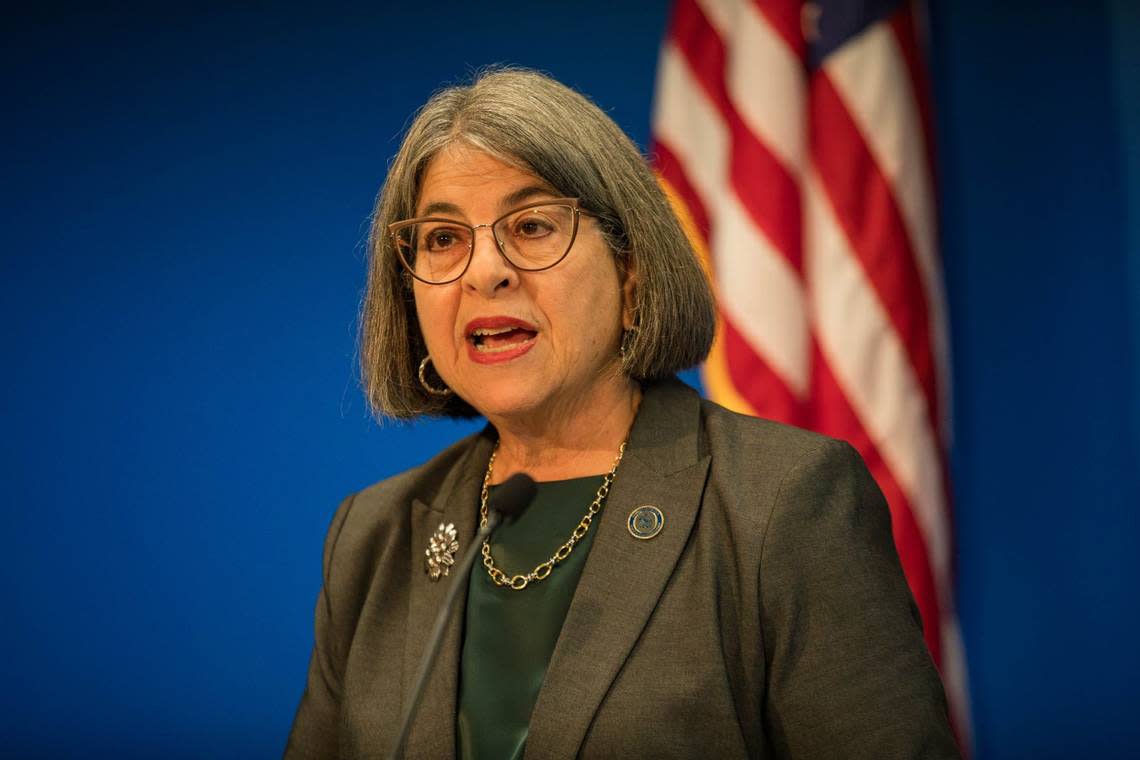Miami-Dade’s garbage fees and tax rates stay flat in 2025 budget plan by Levine Cava

- Oops!Something went wrong.Please try again later.
Tax rates would stay the same for property owners in the $12.7 billion budget proposal Miami-Dade County’s mayor unveiled Monday, with the county’s spending quickly outpacing revenue projections in the coming years as the real estate market cools.
After three years of budgets flush from federal COVID relief programs and surging home prices, Mayor Daniella Levine Cava wants to slow spending growth in 2025 and delay hard decisions on revenue shortfalls until later.
“This year we’re taking a more prudent approach than ever,” Levine Cava said at a press conference Monday, one day before Miami-Dade commissioners will vote on her proposal to keep the county’s four property tax rates flat. “My priority is to meet the needs of our community while keeping taxes as low as possible and budgeting efficiently.”
Last year, the average home in Miami-Dade had an assessed value of about $203,000. Based on inflation, Florida law allows the assessed value for a home to increase 3% this year. That would make the county tax bill under Levine Cava’s proposal about $1,522 for that home under flat tax rates, or roughly $57 more than last year, according to Miami Herald calculations.
READ MORE: Miami-Dade had its first $11 billion budget. Why a lower tax rate won’t cut spending
The 2025 proposal grows Miami-Dade’s budget by $934 million, with enough projected revenue to boost spending by 8%. Last year, spending grew much faster, with a 13% increase in a budget that totaled $11.8 billion.
Levine Cava’s 2025 budget proposal comes weeks before the first-term mayor faces voters on Aug. 20 as she seeks another four years overseeing county government.
The flat-tax proposal follows two years of Levine Cava securing 1% reductions in Miami-Dade’s countywide property-tax rate, which is paid by all property owners in the county. While rates declined slightly, property-tax revenue continues to grow from new construction and rising property values.
Even so, Miami-Dade generates about $43 million less than it would have without the previous tax-rate cuts, and the county is predicting a revenue squeeze in the coming years.
While Levine Cava’s administration last year predicted budget surpluses through the end of the decade for countywide spending, new projections show a $52 million shortfall next year and the deficits continuing through 2030.
READ MORE: Miami-Dade mayor proposes rare tax rate dip. Here’s what that means for homeowners
Budget administrators cited growing expenses, the potential for a cooling economy and other issues. The county is projecting a drop in sales tax revenue compared to last year, blamed in part on changes in state law exempting more purchases from the tax.
Property gains remain in the double digits, allowing Miami-Dade to keep up with growing payroll expenses in a government with more than 31,000 positions. Staffing costs are up 8% this year, according to the budget, to a total cost of about $4.4 billion.
While real estate prices continue to increase, Miami-Dade can’t count on the windfall of new dollars it enjoyed in prior budget cycles.
Overall, Miami-Dade’s real estate grew by 10.7% in taxable value this year, according to the most recent report from the property appraiser’s office. That’s compared to 12.7% last year, and a projected 8.6% increase in 2026, according to county forecasts.
The budget is also the first to include sections for three independent elected offices that will be formed next year out of existing county agencies that currently report to Levine Cava.
Those are the offices of sheriff, elections supervisor and tax collector, which will soon be run by people elected in November under a 2018 amendment to the Florida Constitution mandating the change to independent offices.
Levine Cava cited the new offices as a financial challenge in 2025, with transition costs totaling about $30 million. That includes creating new logos, documents and other materials for the offices; purchasing new uniforms as the police department becomes a sheriff’s office; and funding support functions, such as purchasing, that are currently done by other county agencies.
The budget has other new expenses, including a $10.5 million subsidy for the 2026 World Cup Games, and the first $26 million yearly payment to developers of the new privately run downtown civil courthouse, which is set to open early next year.
Levine Cava’s budget proposal keeps yearly trash fees flat at $547, generating revenue that will fall about $39 million short of what the county’s Solid Waste Department needs to fund twice-weekly garbage pickup and other residential services. The mayor wants to borrow from landfill-expansion funds to cover the shortfall until Miami-Dade either raises rates to meet expenses or figures out another solution. Fees did increase $38 in Levine Cava’s 2024 budget, but it wasn’t enough to close the operating deficit in the chronically underfunded department.
County commissioners will vote on the Solid Waste fees at the board’s regular meeting Tuesday, with the possibility of an increase to $661 a year to cover the shortfall if the board opts to reject the mayor’s recommendation for flat Solid Waste fees.
Commissioners will also have a chance to endorse Levine Cava’s tax plan at the meeting. There, they will set maximum rates for Miami-Dade’s four property taxes ahead of final budget votes in September.
Those taxes fund countywide services, plus the county’s fire rescue and library departments, and municipal services for properties outside of city limits. Homeowners who don’t live in a city rely on Miami-Dade for all municipal services and pay all four taxes.

